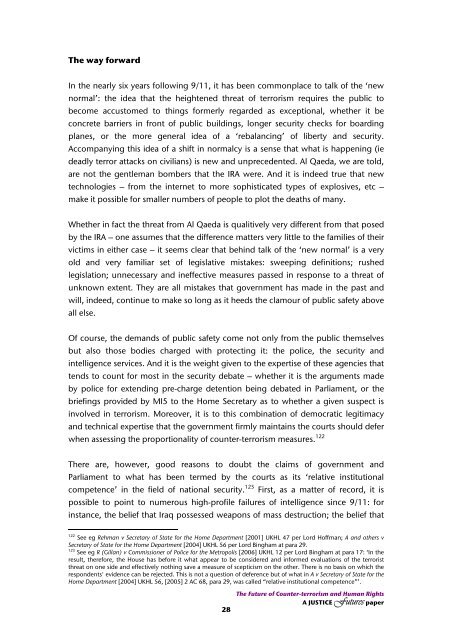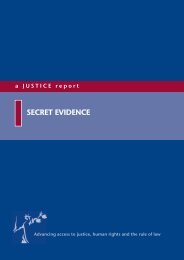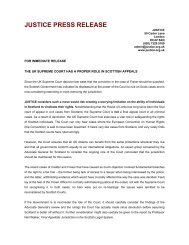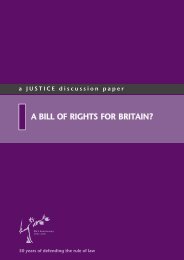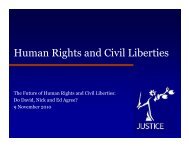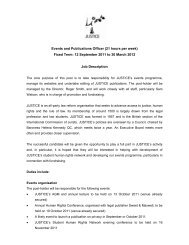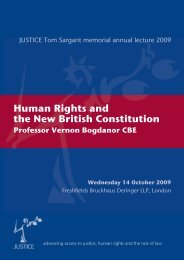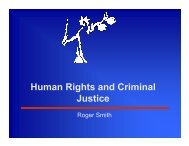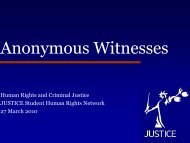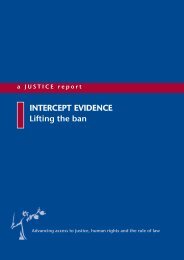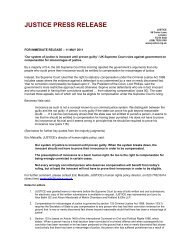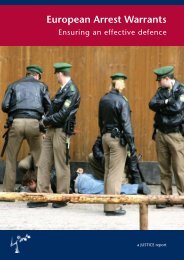The Future of Counter-terrorism and Human Rights - Justice
The Future of Counter-terrorism and Human Rights - Justice
The Future of Counter-terrorism and Human Rights - Justice
You also want an ePaper? Increase the reach of your titles
YUMPU automatically turns print PDFs into web optimized ePapers that Google loves.
<strong>The</strong> way forward<br />
In the nearly six years following 9/11, it has been commonplace to talk <strong>of</strong> the ‘new<br />
normal’: the idea that the heightened threat <strong>of</strong> <strong>terrorism</strong> requires the public to<br />
become accustomed to things formerly regarded as exceptional, whether it be<br />
concrete barriers in front <strong>of</strong> public buildings, longer security checks for boarding<br />
planes, or the more general idea <strong>of</strong> a ‘rebalancing’ <strong>of</strong> liberty <strong>and</strong> security.<br />
Accompanying this idea <strong>of</strong> a shift in normalcy is a sense that what is happening (ie<br />
deadly terror attacks on civilians) is new <strong>and</strong> unprecedented. Al Qaeda, we are told,<br />
are not the gentleman bombers that the IRA were. And it is indeed true that new<br />
technologies – from the internet to more sophisticated types <strong>of</strong> explosives, etc –<br />
make it possible for smaller numbers <strong>of</strong> people to plot the deaths <strong>of</strong> many.<br />
Whether in fact the threat from Al Qaeda is qualitively very different from that posed<br />
by the IRA – one assumes that the difference matters very little to the families <strong>of</strong> their<br />
victims in either case – it seems clear that behind talk <strong>of</strong> the ‘new normal’ is a very<br />
old <strong>and</strong> very familiar set <strong>of</strong> legislative mistakes: sweeping definitions; rushed<br />
legislation; unnecessary <strong>and</strong> ineffective measures passed in response to a threat <strong>of</strong><br />
unknown extent. <strong>The</strong>y are all mistakes that government has made in the past <strong>and</strong><br />
will, indeed, continue to make so long as it heeds the clamour <strong>of</strong> public safety above<br />
all else.<br />
Of course, the dem<strong>and</strong>s <strong>of</strong> public safety come not only from the public themselves<br />
but also those bodies charged with protecting it: the police, the security <strong>and</strong><br />
intelligence services. And it is the weight given to the expertise <strong>of</strong> these agencies that<br />
tends to count for most in the security debate – whether it is the arguments made<br />
by police for extending pre-charge detention being debated in Parliament, or the<br />
briefings provided by MI5 to the Home Secretary as to whether a given suspect is<br />
involved in <strong>terrorism</strong>. Moreover, it is to this combination <strong>of</strong> democratic legitimacy<br />
<strong>and</strong> technical expertise that the government firmly maintains the courts should defer<br />
when assessing the proportionality <strong>of</strong> counter-<strong>terrorism</strong> measures. 122<br />
<strong>The</strong>re are, however, good reasons to doubt the claims <strong>of</strong> government <strong>and</strong><br />
Parliament to what has been termed by the courts as its ‘relative institutional<br />
competence’ in the field <strong>of</strong> national security. 123 First, as a matter <strong>of</strong> record, it is<br />
possible to point to numerous high-pr<strong>of</strong>ile failures <strong>of</strong> intelligence since 9/11: for<br />
instance, the belief that Iraq possessed weapons <strong>of</strong> mass destruction; the belief that<br />
122 See eg Rehman v Secretary <strong>of</strong> State for the Home Department [2001] UKHL 47 per Lord H<strong>of</strong>fman; A <strong>and</strong> others v<br />
Secretary <strong>of</strong> State for the Home Department [2004] UKHL 56 per Lord Bingham at para 29.<br />
123 See eg R (Gillan) v Commissioner <strong>of</strong> Police for the Metropolis [2006] UKHL 12 per Lord Bingham at para 17: ‘In the<br />
result, therefore, the House has before it what appear to be considered <strong>and</strong> informed evaluations <strong>of</strong> the terrorist<br />
threat on one side <strong>and</strong> effectively nothing save a measure <strong>of</strong> scepticism on the other. <strong>The</strong>re is no basis on which the<br />
respondents' evidence can be rejected. This is not a question <strong>of</strong> deference but <strong>of</strong> what in A v Secretary <strong>of</strong> State for the<br />
Home Department [2004] UKHL 56, [2005] 2 AC 68, para 29, was called “relative institutional competence”’.<br />
28<br />
<strong>The</strong> <strong>Future</strong> <strong>of</strong> <strong>Counter</strong>-<strong>terrorism</strong> <strong>and</strong> <strong>Human</strong> <strong>Rights</strong><br />
A JUSTICE <strong>Future</strong>s paper


